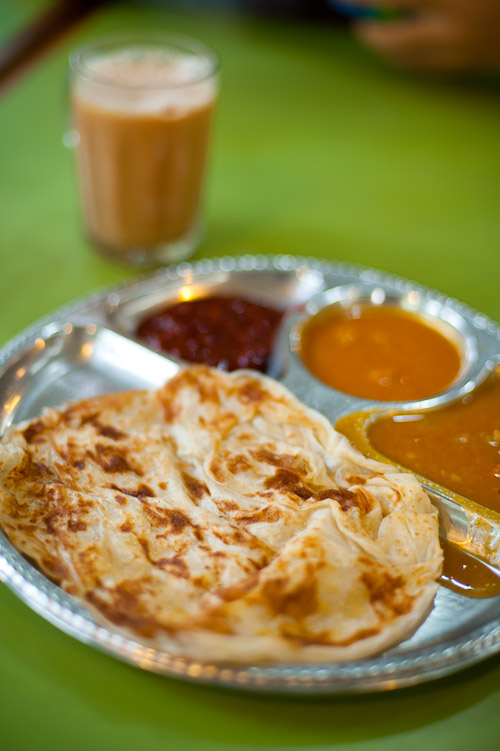 Combine roti canai, a type of fried flatbread served with a spicy dhal-based dipping sauce, teh halia, sweet ginger tea, and throw in a copy of theSun with fresh dirt about Anwar's sodomy trial and you have a thoroughly delicious and entertaining breakfast one could only find in Malaysia.
Combine roti canai, a type of fried flatbread served with a spicy dhal-based dipping sauce, teh halia, sweet ginger tea, and throw in a copy of theSun with fresh dirt about Anwar's sodomy trial and you have a thoroughly delicious and entertaining breakfast one could only find in Malaysia.
Sek Yuen
 Last week I found myself in Kuala Lumpur, Malaysia, attending Joe McNally's photography workshops. Thus, not only was I in photo geek heaven, but this being KL, I was likewise also in Asian food heaven, and with the guidance of EatingAsia and Jarrett, had a string of virtually faultless meals, ranging in scope from vegetarian southern Indian to porky Chinese.
Last week I found myself in Kuala Lumpur, Malaysia, attending Joe McNally's photography workshops. Thus, not only was I in photo geek heaven, but this being KL, I was likewise also in Asian food heaven, and with the guidance of EatingAsia and Jarrett, had a string of virtually faultless meals, ranging in scope from vegetarian southern Indian to porky Chinese.
But the meal that stands out, and which was recommended by both of the above, was Sek Yuen. This longstanding restaurant is unabashedly old-school, and was allegedly a popular destination for wedding receptions in the past:

But it isn't all about appearances here. The kai lan with crispy pork belly:
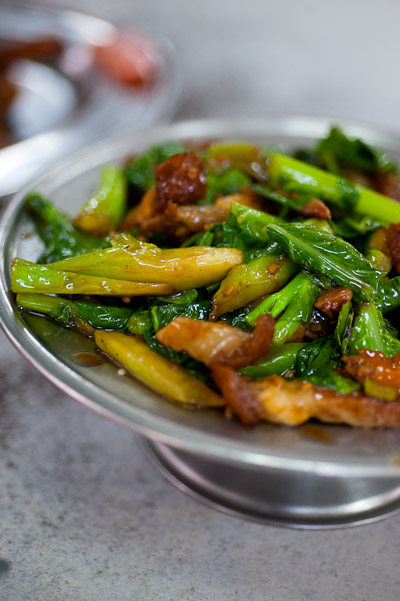
is quite possibly the tastiest Chinese-style flash-fried veggie dish I've yet to encounter: smokey (they still cook everything over wood here), crispy/crunchy, meaty and garlicky; the only thing it could possibly use was a bit of chili.
The restaurant's famous roast duck (virtually every table had an order of this):
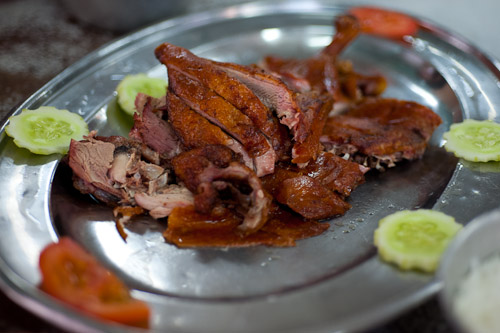
although not entirely photogenic and slightly dry, was immensely satisfying, the crispy skin holding the subtle flavour of a complex dried spice rub.
There was steamed pork ribs:
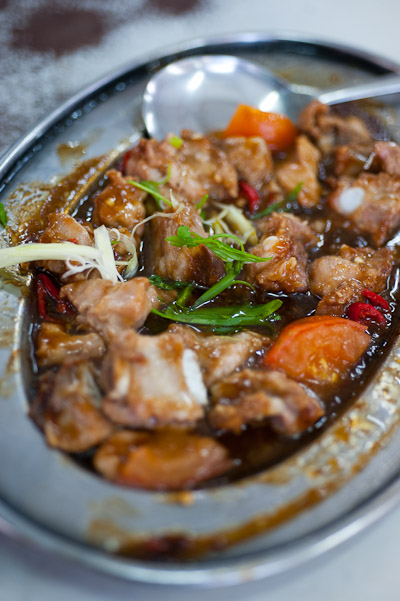
served with an oyster sauce- and sesame oil-heavy sauce, making the dish somehow seem even meatier than its already meaty appearance.
An attempt to order what in Thailand is known as kuy chai phat tao huu (garlic chives fried with tofu) instead got us gourd fried with egg (Thai-accented Teochew Chinese doesn't get me as far as I assumed), but communications problems aside, I found the staff here lovely:
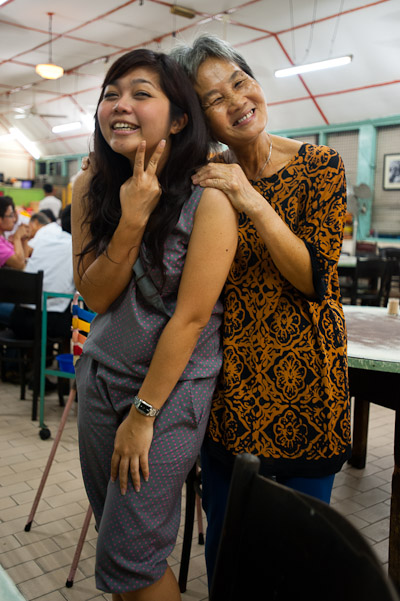
Lovely enough, in fact, for a re-run. Visiting again the very next evening, I had yusheng:
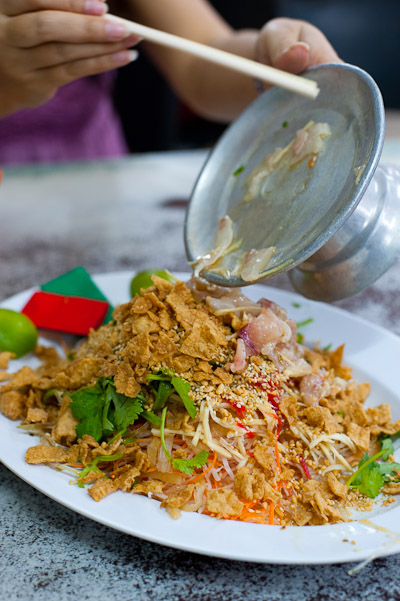
a raw fish 'salad' that has apparently become associated with Chinese New Year in Singapore and Malaysia. The dish is only available for two weeks at Sek Yuen, and with disparate ingredients including (but not limited to) ginger, pomelo, sesame oil, cinnamon and jellyfish, was a fascinating combination of virtually every texture and flavour imaginable.
Anybody visiting Kuala Lumpur is well-advised to check out EatingAsia's Top Ten Eats in KL (I made it to nearly half of them).
Sek Yuen Restoran 313-315 Jalan Pudu, Kuala Lumpur 03 9222 9457 Lunch & dinner, Tues-Sun
View Thai Eats in a larger map
Snapshots from Mae Hong Son: For sale
 20 rai of land, located just outside Mae Hong Song city, 3 million baht (approximately US$90,000).
20 rai of land, located just outside Mae Hong Song city, 3 million baht (approximately US$90,000).
Sigh...
Snapshots from Mae Hong Son: Extreme Engrish
 It's been a while since I've checked out Engrish.com, but this sign, at the Pha Bong Hotsprings, 12km outside Mae Hong Son, reminded me of the site. In case the text above is too small to read, it says:
It's been a while since I've checked out Engrish.com, but this sign, at the Pha Bong Hotsprings, 12km outside Mae Hong Son, reminded me of the site. In case the text above is too small to read, it says:
prohibit dip foot appeareds a pond
prohibit down water uncle in a pond
prohibit sit take a bath on pond edge
I was bathing here one morning (a wonderful experience) and apparently violated the last rule, as a man walked over to tell me that I shouldn't sit on the elevated edge of the hot spring. According to him, people were complaining it 'didn't look nice' and that the 'dirty water' from my body would go back into the hot spring (a vast pond of boiling water, I remind you) and make it unclean.

I obliged, but was also reminded of how utterly important appearances are in Thailand, often taking precedence over reality, common sense and proper grammar.
Snapshots from Mae Hong Son: Khao puk ngaa
 Khao puk ngaa, pounded sticky rice coated with ground sesame, a traditional sweet, Mae Hong Son
Khao puk ngaa, pounded sticky rice coated with ground sesame, a traditional sweet, Mae Hong Son
Snapshots from Mae Hong Son: Still life
 Gourds for sale at Mae Hong Son's morning market
Gourds for sale at Mae Hong Son's morning market
Hotshoe in KL
 Last week I attended two of Joe McNally's photography workshops in Kuala Lumpur, Malaysia, The Hot Shoe Diaries and Let There Be Light. I learned heaps and got the chance to use lots of previously unfamiliar lighting equipment, although not always successfully, as illustrated above. But regardless of our success, Joe was an enthusiastic, fun and inspiring teacher:
Last week I attended two of Joe McNally's photography workshops in Kuala Lumpur, Malaysia, The Hot Shoe Diaries and Let There Be Light. I learned heaps and got the chance to use lots of previously unfamiliar lighting equipment, although not always successfully, as illustrated above. But regardless of our success, Joe was an enthusiastic, fun and inspiring teacher:

and in addition to two of his excellent books and some cool new Lastolite gear, I took home several techniques and ideas that I hope to use soon. If Joe is ever in your part of the world, I'd highly recommend investing in his workshops. Failing that, do check out his books The Moment It Clicks and The Hot Shoe Diaries, both of which are fun and pretty enough to grace the coffee table, but informative enough for the photo geek.
(For any photo geeks out there, the shot above was taken with my D700 and a 70-200 f/2.8 with two barn-doored SB900s providing the backlights and to camera left, an SB800 shot through a 30" Ezybox Softbox diffused additionally through a TriGrip, all of this, believe it or not, in TTL mode.)
Snapshots from Mae Hong Son: Party animals
 Handing out khao ya kuu on the streets of Mork Jampae, Mae Hong Son
Handing out khao ya kuu on the streets of Mork Jampae, Mae Hong Son
My stay in Mae Hong Son coincided yet again with khao ya koo, a Shan celebration in which caravans of partying locals hand out packets of sweetened sticky rice to anybody and everybody in the name of making merit. It's heaps of fun and reminded me of the fact that I seem to bump into some sort of festival or another virtually every time I'm in Mae Hong Son.
Snapshots from Mae Hong Son: Village Life
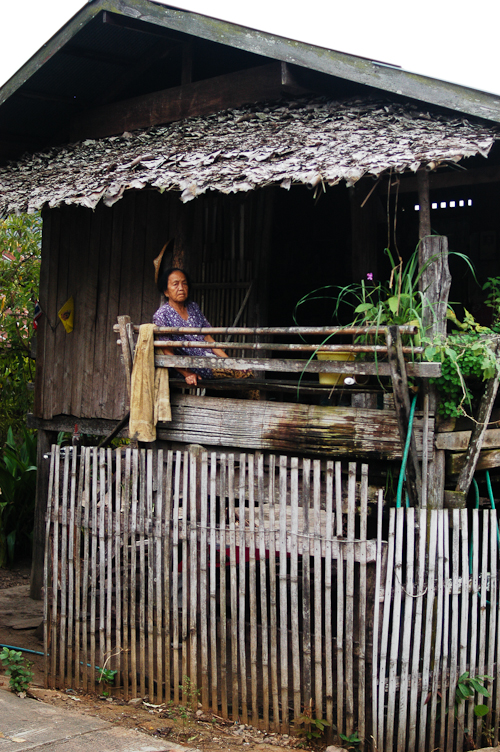 Typical Thai Yai house and resident, Mork Jampae, Mae Hong Son
Typical Thai Yai house and resident, Mork Jampae, Mae Hong Son
Sometimes Mae Hong Son can appear as if it's stuck in a time warp. A considerable amount of the people here still speak the local dialect, eat the local cuisine and dress traditionally, many even wearing the kup tai (a conical hat). Likewise, most villages here appear to have changed equally little in decades. This is particularly the case with Thai Yai villages such as Mork Jampae, shown above, located about 12km from Mae Hong Son. The vast majority of the houses in Mork Jampae are made from wood and many still feature roofs made from bai tong tueng, a type of local leaf. And as is the case in other Thai Yai villages across the province, the houses are almost always incredibly tidy with a wooden or bamboo fence out front, upon which flowers and/or vegetables are grown. The only obvious concession to modernity is that instead of the tho, a clay vessel of water traditionally situated in front of the house for passers by, most houses now have modern water filters with a tap.
Snapshots from Mae Hong Son: Lung Long
 Lung Long, Mork Jampae, Mae Hong Son
Lung Long, Mork Jampae, Mae Hong Son
Lung Long is one of the few remaining people in Mae Hong Son who is skilled in the Shan art of doing metal fretwork. Such fretwork decorates the rooflines of the province's largely Burmese-style Buddhist temples and was previously made by hand from zinc, but now stainless steel or aluminum is used. Lung Long is mostly retired these days, but will occasionally do work to order, such as the peacocks above that I commissioned. If you want a special souvenir from Mae Hong Son and are willing to go to Mork Jampae (a Thai Yai village about 12km from Mae Hong Son), give him a call at 084 367 3618.
Snapshots from Mae Hong Son: Breakfast
 Locals eating breakfast at Mae Hong Son's morning market
Locals eating breakfast at Mae Hong Son's morning market
The breakfast choices offered at Mae Hong Song's morning market are truly unlike anywhere else in Thailand. Although most tourists from Bangkok head directly for the jok (rice porridge) stall, there are some very cool local dishes including delicious deep-fried goodies called khang pong, the local version of khanom jeen nam ngiaw, a watery pork- and tomato-based soup served over rice noodles, and thua oon, a weird but tasty Burmese noodle dish in a thick gram bean gravy.
Snapshots from Mae Hong Son: The Walk
 A rice field outside Mae Lana, Mae Hong Son, northern Thailand
A rice field outside Mae Lana, Mae Hong Son, northern Thailand
A few pics of my walk from Ban Mae Lana to Ban Tham Lot.
 Eating breakfast at a hill tribe village outside Mae Lana
Eating breakfast at a hill tribe village outside Mae Lana
 Piglets at a hill tribe village outside Mae Lana
Piglets at a hill tribe village outside Mae Lana
 Limestone mountains outside Ban Tham Lot
Limestone mountains outside Ban Tham Lot
The walk followed, more or less, this route:
View Thai Eats in a larger map
Snapshots from Mae Hong Son: Khao Kan Jin
 I've previously blogged on khao kan jin, rice steamed with blood and bits of meat -- a Shan/Thai Yai dish that's popular here in Mae Hong Son. After eating at the previously mentioned stall for years, I finally found another vendor, hidden in a side street and located roughly across from the TOT (Telephone Organization of Thailand) office. Drizzled with garlic oil and served with sprigs of cilantro, raw garlic cloves and deep-fried dried chilies, there isn't much to distinguish the khao kan jin (pictured above) here from my old standby. Both stalls are open at roughly the same time (3-6pm) and both serve khanom jeen nam ngiaw and deep-fried pork rinds. If anything, I'd say that the khao kan jin here is slightly less rich, and the stall also does a variation of the dish that has not been steamed and thus contains raw blood -- the result being a rather intimidating bright pink ball of rice.
I've previously blogged on khao kan jin, rice steamed with blood and bits of meat -- a Shan/Thai Yai dish that's popular here in Mae Hong Son. After eating at the previously mentioned stall for years, I finally found another vendor, hidden in a side street and located roughly across from the TOT (Telephone Organization of Thailand) office. Drizzled with garlic oil and served with sprigs of cilantro, raw garlic cloves and deep-fried dried chilies, there isn't much to distinguish the khao kan jin (pictured above) here from my old standby. Both stalls are open at roughly the same time (3-6pm) and both serve khanom jeen nam ngiaw and deep-fried pork rinds. If anything, I'd say that the khao kan jin here is slightly less rich, and the stall also does a variation of the dish that has not been steamed and thus contains raw blood -- the result being a rather intimidating bright pink ball of rice.
Khao kan jin Located roughly across from TOT office, Mae Hong Son 3-6pm
View Thai Eats in a larger map
Snapshots from Mae Hong Son: Mae Lana
 I told you it was pretty.
I told you it was pretty.
The above is Mae Lana, the Shan village mentioned in my previous post. Mae Lana is located about 50km northeast of Mae Hong Son in a steep picturesque valley and is famous for Tham Mae Lana, a 12km-long cave.
Taking a break from the hectic metropolis that is Mae Hong Son, I decided to drive up to Mae Lana and stayed a night at Garden Home, the village's only guest house. Waking up early the next morning, I went on a 20km walk that wound through mountain scenery:

and the occasional hilltribe village before terminating at Ban Tham Lot, another village near a cave.
Snapshots from Mae Hong Son: Chicken
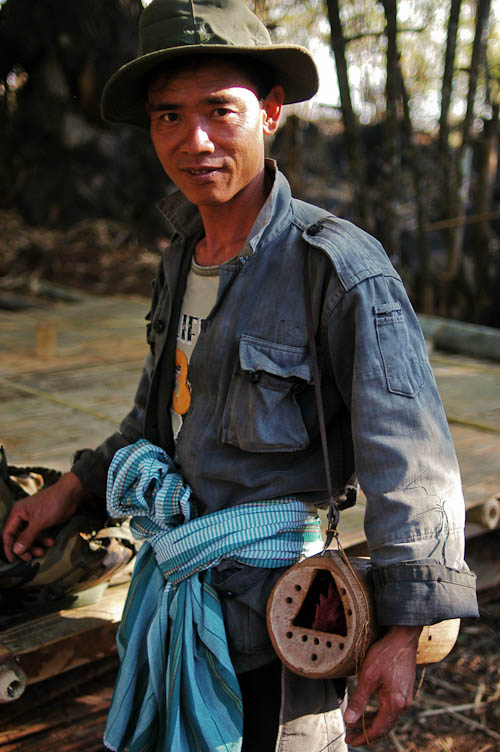 To regular readers, it will come as no surprise that, yet again, I find myself up in Mae Hong Son, northern Thailand. This time I'm only up here for 10 days, and am already doing a fair bit of writing, so I'd prefer to keep my blogging to mostly image-based, marginally food-related posts. A caveat: I'm shooting with my old D100, a single 35mm f/2 and am editing the images on a laptop, so the images won't be amazing, but to be honest, I find that the 400ISO JPEGs from this camera have an attractive old-school film-like quality.
To regular readers, it will come as no surprise that, yet again, I find myself up in Mae Hong Son, northern Thailand. This time I'm only up here for 10 days, and am already doing a fair bit of writing, so I'd prefer to keep my blogging to mostly image-based, marginally food-related posts. A caveat: I'm shooting with my old D100, a single 35mm f/2 and am editing the images on a laptop, so the images won't be amazing, but to be honest, I find that the 400ISO JPEGs from this camera have an attractive old-school film-like quality.
I came across the guy above just outside Ban Mae Lana, possibly the most attractive rural village anywhere in the country. He made for a nice portrait, but initially I was drawn to his 'luggage':

a chicken container carved out of a length of bamboo, complete with a window and airholes! He explained that he takes the rooster into the woods, ties it to something and encourages it to call. This apparently attracts any 'wild chickens' (kai paa), which he then shoots. Unfortunately this particular chicken wasn't yet ready. "He's still scared of the forest," explained the man, "He needs to be trained."
The Fridge
 Somehow I'd only consumed one pie, hastily and in the front seat of a car, during my stay in New Zealand, a situation I was determined to remedy. So on my last day in the country Hock did a bit of online research and we headed over to Kingsland to sample what the Internet told us were Auckland's best pies.
Somehow I'd only consumed one pie, hastily and in the front seat of a car, during my stay in New Zealand, a situation I was determined to remedy. So on my last day in the country Hock did a bit of online research and we headed over to Kingsland to sample what the Internet told us were Auckland's best pies.
Arriving at The Fridge I followed Hock's strict instructions and avoided the Thai Red Curry Chicken and Moroccan Lamb pies and instead grabbed a Mince, a Steak and Guinness and something having to do with cheese and potato. The pies were $6, which apparently makes them somewhat spendy by Auckland pie standards.
We stopped at One Tree Hill Park and dug in:

The mince was a classic, with a buttery flaky crust and a rich filling that, coupled with liberal squirts of tomato sauce, made a huge mess. The Steak and Guinness boasted a decent but somewhat bland stew-like filling with carrots and potatoes. And the cheese and potato pie was predominately gloopy and heavy.
I'm not qualified to say whether or not these are Auckland's best pies, but I thoroughly enjoyed the mince in particular, and Hock, a native and pie enthusiast, seemed to agree. And if I'm being totally honest, I even enjoyed the half of the cheese and potato pie, as it ensured that I had absolutely no reason to eat airline food -- even if I wouldn't eat for another four hours.
The Fridge 507 New North Road Kingsland, Auckland New Zealand +64 (0)9 845 5321 730am-4pm Mon-Fri, 8am-4pm Sat & Sun
View Thai Eats in a larger map
The most exotic meal of all
 Because I've lived nearly my entire adult life in Thailand, a place where eating things such as raw blood is relatively commonplace, and because some people mistakenly consider me an authority on such bizarre foods, I'm more than a bit embarrassed to reveal what I'd consider my first exotic meal.
Because I've lived nearly my entire adult life in Thailand, a place where eating things such as raw blood is relatively commonplace, and because some people mistakenly consider me an authority on such bizarre foods, I'm more than a bit embarrassed to reveal what I'd consider my first exotic meal.
It was almost certainly a meal I ate when I was about 12, just before I made my first trip abroad. I had been invited to have dinner at the home of an ice hockey teammate, an Australian, and was served roast lamb. It was my first time ever eating the meat (I believe this was also the same day when I first tasted Vegemite -- you can imagine the cumulative culinary shock to my system), and I remember wondering beforehand if I'd be able to get it down. Even the dinner table, topped with exotic-sounding condiments such as mint sauce and chutney, a gravy boat, cloth napkins and the family's special plates, not to mention the family's somewhat formal table manners, were intimidating and foreign and a world away from my family's informal and very American concept of dinner.
In the end I had no problem eating the lamb, and even enjoyed the meal, but had largely forgotten about the whole experience until recently, when on my recent trip to New Zealand, I was invited to have roast lamb with my buddy Hock's family.
We began, naturally, with a leg of lamb:

which we seasoned and studded with garlic and rosemary.
Hock made mint sauce according to his grandmother's recipe:

which involved grinding fresh mint, sugar, salt and malt vinegar to a paste in a mortar and pestle.
He also made his grandmother's fish pie:

a delicious mixture of smoked fish, scallops and shrimp held together by a thick roux.
While all this was baking, the kids came by with chocolate slice that they had made:

and Grandma Chris topped her famous and delicious eclairs:

After nearly two hours in the oven, the lamb was done:

the home-grown onions, potatoes and kumara (a type of local sweet potato) roasted:

and the fish pie baked:

and we sat down to a roast lamb dinner, my second in 20 years:

This time around the meal didn't feel nearly as exotic, and was even somewhat homey and familiar, confirming for me that all these years in Thailand have conditioned me to eat anything, even roast lamb.
Hunting and gathering in New Zealand
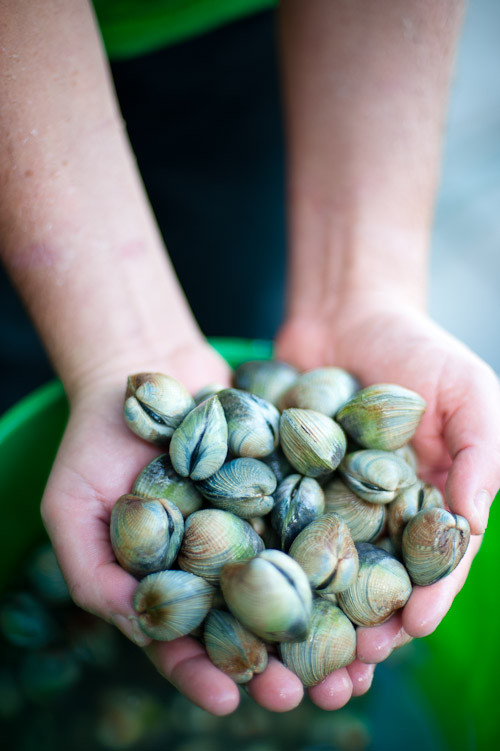 Frankly, I wasn't blown away by my restaurant meals during my recent stay in Auckland. We had some genuinely fun and tasty dinners, but what I'll continue to remember are the meals based around ingredients that we were able to pick, scavenge and hunt ourselves.
Frankly, I wasn't blown away by my restaurant meals during my recent stay in Auckland. We had some genuinely fun and tasty dinners, but what I'll continue to remember are the meals based around ingredients that we were able to pick, scavenge and hunt ourselves.
Our hunting and gathering started close to home, at G and G's beautiful garden just outside Auckland:
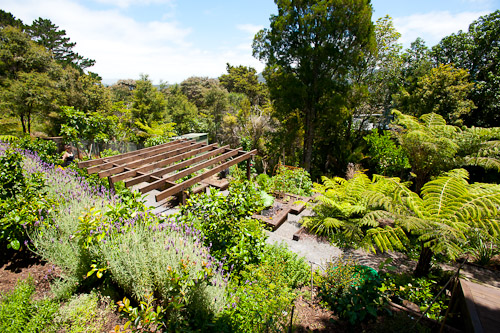
which had everything from fresh herbs to potatoes:
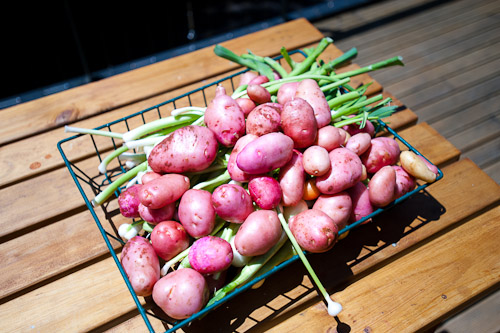
Maytel had the brilliant idea to take some of the abundant Swiss chard (known locally as silverbeet) and combine it with a blue cheese studded béchamel, which Hock topped with crispy breadcrumbs:

Twice we were given rabbit, an invasive menace in New Zealand, whose hunting is encouraged:

One lot we braised with red wine and served over homemade gnocchi:
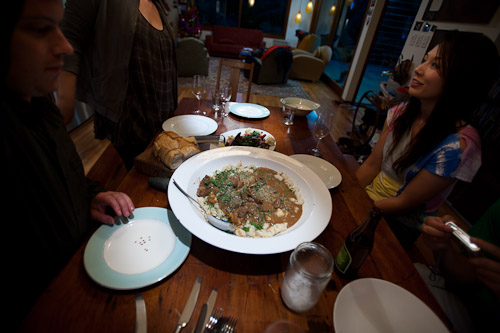
and with another two I made two vast pots of rabbit and oyster gumbo, easily the tastiest gumbo I've ever assembled.
After a few days in Auckland we headed over to nearby Waiheke Island:

where within minutes of arriving, we were on our knees looking for pipis, a type of local shellfish:
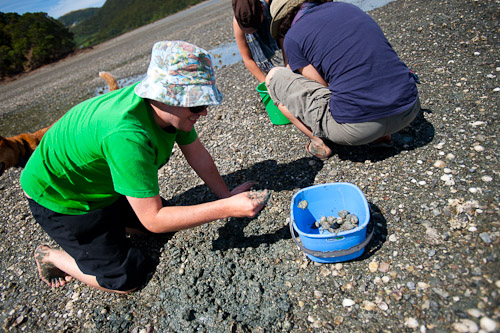
We found none, but instead came upon heaps of deliciously salty cockles, half of which we grilled:
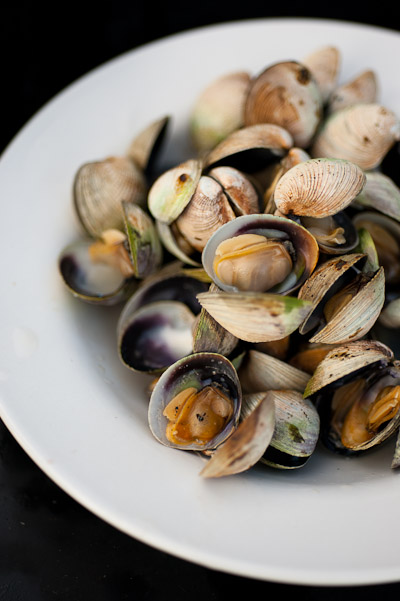
accompanied, courtesy of G and G, by a 2000 vintage Moët (it wasn't all hard work):
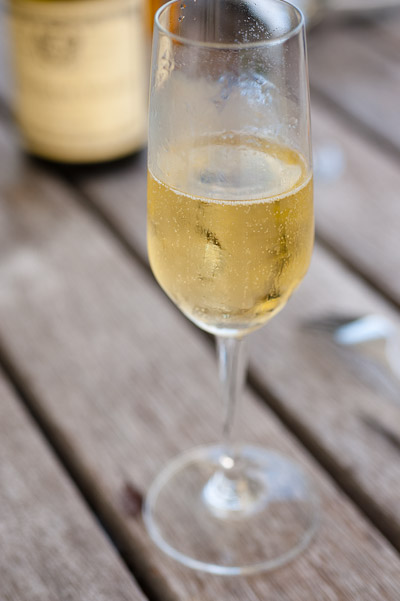
and the other half Maytel stir-fried Chinese-style.
The next day we took off on G and G's boat, The Beaver, for some fishing, and returned 12 hours later with this catch of snapper:
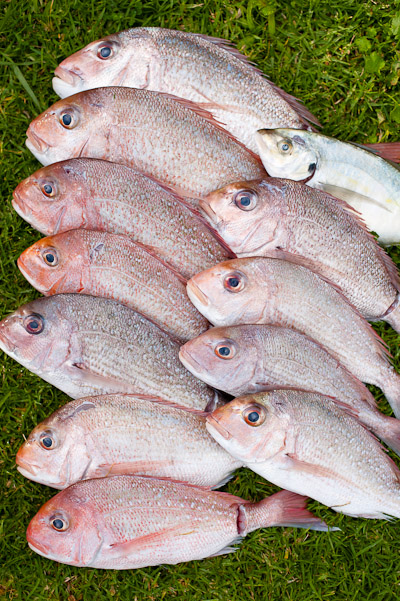
Hock filleted the entire lot, some of which we gave to the neighbours, some of which I made into a ceviche (following this simple recipe from memory), and the remainder of which he made into some truly memorable fish and chips:
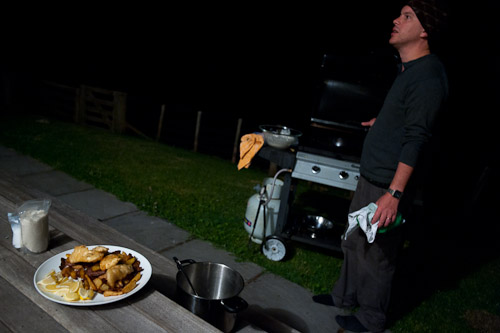
Amazingly, it wasn't until virtually my last day in New Zealand that I set foot in a grocery store.
The best Thai dish you've never heard of...
 Khao khluk kapi at Ratana, a curry stall in Bangkok's Nang Loeng Market
Khao khluk kapi at Ratana, a curry stall in Bangkok's Nang Loeng Market
is a series of food-related posts I'll be contributing to CNNGo's Bangkok pages. My first post is about khao khluk kapi, rice-based salad with origins in central Thailand.
Where in the World am I?
Hint: I'm in a remote and exotic land where, for almost two decades, the above was the epitome of prime-time television entertainment. Where am I?











